- Home
- Leslie Meier
Wedding Day Murder Page 11
Wedding Day Murder Read online
Page 11
Soon the sky was filled with exploding fireworks, and the party moved to the upper deck, crowding around the railing facing the harbor.
Sue woke and, guessing that her greenish pallor was not the reflection of the fireworks, Lucy helped her up and led her downstairs. Unsure where the head was located, Lucy steered her toward the railing, just in case.
“Don’ fee-el goo’,” said Sue.
“Look at the fireworks,” Lucy urged, hoping to distract her.
Sue clutched the railing and leaned over. Here we go, thought Lucy, but she was wrong. Sue was pointing to the water.
“Whaash tha?”
Lucy looked down and saw something white.
“A reflection?”
“No.” Sue leaned over farther and Lucy grabbed the back of her dress.
“Whoa, there. You’re going to fall in.”
“Thas wha’ happened. Somebody fell in.”
Lucy looked again. Sue was right. Whatever was floating there did resemble a human shape.
“It’s probably garbage or something,” said Lucy, looking up as a giant rocket exploded overhead, filling the sky with light. In the distance she heard a boat motor start up, and she felt the yacht rock slightly under her feet as the wake hit.
“Not garbage.” Sue tugged her sleeve. “Look.”
Lucy looked and saw the white form now had arms and legs and a head, all floating a few inches below the surface of the water. Another wave came and the body rolled over. Even in the dim light, Lucy was sure it was Ron. The recognition hit her like a tidal wave, and she found herself gripping the railing with every bit of her strength.
Sue moaned. “I’m gonna be sick.”
Chapter Thirteen
Lucy forced herself to unclench her hand and wrapped an arm around Sue, who promptly retched and heaved over the side. For a moment, everything receded to a distant point while she struggled to overcome her own queasiness. She set her teeth, took slow, steady breaths, and locked her gaze on to the beam of light streaming from the lighthouse on the point.
“Does the lady need some assistance?” inquired one of the stewards.
Lucy had never been so glad to see anyone in her life.
“Oh, yes,” she said, pointing to the water. “There’s a body.”
The steward leaned over the rail, then snapped upright as if he had received a jolt of electricity.
“Don’t move,” he said. “I’ll get help.”
Lucy tightened her grip on Sue, who was bent over the railing and moaning, and started to count. She had gotten to twenty-seven when the steward returned with a splendidly uniformed man, whom Lucy took to be the captain, and a couple of crewmen. The steward hustled Sue off to a cabin, the captain ordered the crewmen into a small boat to check the body, and Lucy was led to a chair.
“What happened?” demanded the captain, keeping his voice low.
“We were watching the fireworks and my friend felt sick. We went to the back of the boat and there he was.” Lucy bit her lip. “I think it’s Ron Davitz.”
One of the crewmen returned and whispered something in the captain’s ear.
“Not a word to anyone,” cautioned the captain. “I’m calling the police and confining the party to the grand saloon.”
“What about me?” Lucy asked.
“You will stay where you are.” He nodded at the crewman, who took a position behind her chair.
Lucy obeyed, waiting while the captain made a brief announcement and crew members ushered the group of women inside. She thought of Thelma and Sidra, still unaware of the terrible news they would soon hear. She thought of Sue, sick and alone belowdecks.
“Can’t I go to my friend?” she asked the crewman.
“Sorry. Captain’s orders.”
The boat rocked slightly, and she thought of the body floating against the side of the boat. Ron’s body.
“Is he still in the water?” she asked.
“Captain’s orders were to remove him only if there were signs of life.”
“Were there?”
He shook his head.
Lucy looked at him more closely and saw that he was no older than Toby. It was then that tears sprang to her eyes and she started to shake with sobs. The crewman put a hand on her shoulder and handed her a tissue. She sat there miserably, dabbing at her eyes, waiting for the police.
The last of the fireworks had fizzled to ashes, and only a few stragglers remained in the parking lot when the police arrived quietly, without sirens or flashing lights. Lucy, lost in her own thoughts, wasn’t even aware they were on the scene until she was told the lieutenant wanted to talk to her and was ushered to a cabin.
As she expected, it was Lieutenant Horowitz. He was with the state police and responsible for investigating serious crimes in the area. Lucy and he had crossed paths many times before.
“Mrs. Stone,” said the lieutenant, greeting her with his usual sad expression, “please sit down.”
Lucy perched on the end of a bunk. The lieutenant was sitting only a few feet away in the tiny cabin, at a small desk that was mounted on the wall. They were so close that she couldn’t avoid his gray eyes. She saw there was a poppy seed stuck between his teeth.
“Just start at the beginning,” he said.
Lucy looked at her lap. When, exactly, was the beginning, she wondered. What incident had started the chain of events that had resulted in Ron’s death? She looked at Horowitz blankly, noticing that the ceiling light glinted on the stubble that was reasserting itself on his clean-shaven chin.
“This was some sort of party?” he prompted.
“A wedding shower for Sidra Finch. She’s engaged to Ron Davitz. He and his mother are visiting on this yacht to plan the wedding.”
“When did you get here?”
“Seven, maybe.”
“Did you notice anything out of the ordinary?”
“It was just a typical party. . . .”
Horowitz interrupted. “You call this typical? You go to a lot of parties on million-dollar yachts?”
“Ron’s quite wealthy. He’s supposed to be the next Bill Gates.”
Horowitz raised his eyebrows.
“Like I said, it was a wedding shower. There were food and drinks. Sidra opened presents and then everybody went to the upper deck to see the fireworks.”
“That’s when you noticed the body?”
She nodded. “My friend, Sue Finch, Sidra’s mother, had a little too much to drink. She felt sick so we moved away from the others, down to the lower deck. That’s when we saw the body.” Lucy paused. “Is it Ron?”
“The body hasn’t been identified yet.” Horowitz scratched his long upper lip. “Did you hear any splashes, an altercation, anything like that?”
Lucy took a sharp little breath. She remembered Sue telling her about Sid’s gun. Could Ron have been shot? Could Sid have done it?
“Was he shot?” she asked.
Horowitz looked at her closely. “Did you hear a shot?”
“There were fireworks,” she said.
“Yes.” Horowitz’s face was expressionless.
Lucy had to know. “Do you think he was shot?”
“I told you, we haven’t recovered the victim yet.”
“You said ‘victim.’ Does that mean it’s homicide?”
“I don’t know if he’s a homicide victim or an accident victim. Right now, we’ve got a victim victim.” Horowitz narrowed his eyes. “Is there something you’re not telling me?”
“No.” Lucy shook her head. From far off, she heard the rumble of thunder.
“I hope you’re telling the truth.”
“I am.” She nodded.
He looked at her skeptically. “And you’re going to leave this investigation to the police, right?”
“Of course.” She pursed her lips. “Can I see Sue now?”
“Not until I’ve questioned her. Do you have your car here?”
“Yes.”
“Can you drive?”
She nodded.
“Then I think you should go home.”
“Home?” Lucy was dumbfounded. Everything was all right at home. She was needed here. She couldn’t leave Sue and Sidra. And what about Thelma? All three survivors would need sympathy and support. “They need me here.”
“They’re in good hands. Trust me.” He opened the door and nodded at the uniformed trooper outside.
Lucy realized with a shock that she’d been under guard the whole time. Was she a suspect, or was this just standard crime scene procedure?
“Good night, Mrs. Stone.”
She nodded mutely and followed the trooper off the boat and out to the parking lot, where a flash of lightning illuminated the scattered cars.
“Will you be all right? Do you want an escort?” asked the trooper. Lucy could hardly hear him over a thunderclap.
“I’ll be okay,” said Lucy, opening the door. But as she started the car, she realized that she was definitely not okay. Her emotions were a confused jumble of horror and anger and, most of all, fear. She was terrified of the revelations tomorrow might bring.
She shifted into gear and drove off as the first raindrops started to fall.
Chapter Fourteen
Maybe it was a dream—a nightmare—thought Lucy, as she drove through the downpour along the dark and empty roads that led home. Occasional flashes of lightning revealed familiar landmarks: Main Street turned into Main Street Extension; there was the stop sign at the intersection with Route One, and then the familiar turnoff onto Red Top Road. Nothing had changed. The Methodist Church was still standing on the corner of Main Street and Church Street; the Quik-Stop was in its usual place on Route One; there was still that dip in the road just before she began the climb up old Red Top Hill.
And when she got to the old farmhouse on top of the hill, the porch light would be on for her. Inside, Bill would probably be watching TV and the girls would be getting ready for bed or squabbling over the phone or deciding what to wear tomorrow. When she pulled into the driveway, Kudo would bark and scratch at the door until somebody let him outside so he could greet her properly.
Ron’s death hadn’t changed her life, but it had changed everything for Sidra. Lucy could remember the very moment it had occurred to her that something could happen to Bill. They had only been married for a few weeks; she was walking home from work, eagerly anticipating their daily reunion. What would it be like, she had wondered, if he wasn’t there? That tiny, evil thought mushroomed in her mind until she was running down the street, terrified that he’d been hit by a car or shot in a holdup or stricken with a fatal heart attack. She’d burst into the house and flung herself in his arms, sobbing hysterically with relief to find him sitting at the kitchen table doing a crossword puzzle.
For Sidra, however, there would be no strong arms to embrace her; there would be no laughter over her silly fears. For her, the unthinkable had come true. She had lost the man she loved. The joy of her anticipated wedding had vanished, leaving nothing but pain and loss. Love was risky, thought Lucy, putting aside her dislike of Ron. He was the one Sidra had pinned all her hopes and dreams for the future on, he was the one she had chosen. And now, like a gambler who bets his entire stake in a game of chance, she had lost it all in one spin of the wheel.
The only thing worse than losing your partner, thought Lucy, would be losing your child. It wasn’t supposed to happen like that. In the natural order of things, parents died first, leaving their children to perpetuate their line. From the first pangs of labor to the bloody birth and on through the perils of childhood, mothers learned to keep their eyes fixed firmly on the future. They poured love into their babies along with every ounce of milk, and willingly sacrificed their own health and comfort for the sake of their little ones. Thelma had been just such a mother; Lucy was sure of it. Once she was widowed, Ron had become the entire focus of her existence, and now he was gone.
Lucy groaned aloud, forcing herself to look at the possibility that Ron’s death hadn’t been accidental. This was one train of thought she didn’t want to ride to the end of the line, but since Sue had told her the gun was missing, she had to consider the possibility that Sid had found it and used it. That, thought Lucy, would have all the trappings of tragedy. Sidra would lose not only her lover but her father; Sue would lose her husband and possibly her daughter; and Sid would lose everything.
Not so fast, thought Lucy. Here she was creating a Shakespearean drama, and she didn’t even know if Ron had been murdered. Maybe he just slipped off the boat and banged his head. It happened. It wasn’t time to panic—not yet. Right now, the best approach would be to wait and see. There was no sense in jumping to conclusions.
On the other hand, Lucy thought as she pulled into the driveway, it wouldn’t hurt to be prepared for the worst. She turned off the ignition and sat for a moment, looking at the glowing porch light. A shadow appeared at the door, which opened, and she heard Kudo barking. She opened the car door and he bounded through the rain, tail wagging. She waited for him to shake, then got out of the car and ran with him, dodging puddles, to the house.
Bill opened the door for her and she ran inside, throwing her arms around him and burying her head in his chest and sobbing.
“Whoa,” he said, stepping back to catch his balance. “What’s all this?”
Excited by this display of emotion, Kudo pranced around them, barking.
From the family room, they heard Zoe shriek, “Mom’s home!” In a moment, Zoe herself had thrown her small body against Lucy, wrapping her arms around her hips. Sara stood in the doorway, looking as if she wished she weren’t far too sophisticated to join in the group hug.
Struggling to gain control of herself, Lucy used Bill’s shirt to wipe her eyes.
“What’s the matter?” he asked.
Zoe was jumping up and down, still caught up in holiday excitement. “I’m a firecracker,” she said.
“Shut up,” said Sara. “Can’t you see Mom’s upset?”
Zoe stepped back and looked up at her mother’s face. “Sorry,” she whispered.
“It’s okay.” Lucy stroked her cheek. “You had your face painted.”
“At the party. Sadie’s Mom did it. They’re stars, see. Just like on a firecracker.”
“I hope there weren’t any real firecrackers,” said Lucy, chattering and shaking. “They’re dangerous.”
“You better sit down,” said Bill, pulling out a chair for her. “Sara, get your mother a blanket or something. Zoe, maybe you should get yourself to bed.”
Zoe’s face crumpled.
“It’s okay, honey. Come sit on my lap.”
Lucy rested her cheek on Zoe’s silky little head and held her close, breathing in her sweet little-girl scent.
“You smell good,” said Lucy, sniffling. “Like sunshine and shampoo.”
Bill handed her a small glass of brandy and draped the afghan around her shoulders.
“Thanks,” said Lucy, giving him a weak smile. “This was some night.” She paused, sipping at her drink. “Ron’s dead.”
Bill didn’t recognize the name. “Who’s Ron?”
“Sidra’s fiancé,” said Sara, in an everybody-knowsthat tone of voice and rolling her eyes.
“That’s terrible,” said Bill, too shocked at the news to scold her for being fresh. “What was it? A car crash?”
“I was on the yacht, waiting for the fireworks to start, and I looked down and he was . . .” Lucy paused to blow her nose. She took a deep breath. “He was in the water.”
“You think he drowned?” asked Bill.
Lucy shook her head. “I don’t know.” She shuddered, recalling the sight of Ron’s lifeless body floating beneath the surface. “The police were there.”
Zoe let out a big sigh and leaned her back against her mother’s chest. She’d been waiting a long time to tell her mother about the party and wasn’t going to be distracted. “Well, we had a fight at Sadie’s house with the boys. They were going to light firec
rackers and throw them at the girls but I went and told Mr. Orenstein and he took them away. And he told the boys that if they kept bothering us girls he wouldn’t let them stay up to see the fireworks.”
Lucy could just picture Zoe’s righteous indignation as she tattled on the boys and the thought made her smile.
“Did you have a good time, too, Sara?”
“It was okay. I got a home run.”
Lucy knew that a game of softball was a July Fourth tradition at the Orensteins’ barbecue.
“That’s great. How’d your father do?”
“I got a base hit,” said Bill, yawning. “And I caught a few high flies when I was fielding. Not bad for an old man.”
Lucy glanced at the clock.
“Gosh, it’s almost ten. You girls better get to bed or you’ll be too tired for day camp tomorrow.”
“Do I have to?” whined Zoe.
“You have to,” said Lucy, setting her down on her feet and giving her a little push toward the stairs. “I’ll be up to kiss you good night in a few minutes.”
Bill waited until they were gone, then he sat down next to her at the table and took her hand.
“I want the whole story,” he said in a low voice. “Not the G version. Do the cops think he was killed?”
Lucy clasped his hand with both of hers, holding on tightly.
“I don’t know what they think. They didn’t tell me. But they sure acted like something was funny. They separated everybody, wouldn’t let people talk to each other. Then they made me leave; they wouldn’t even let me help. Poor Sue. And Sidra.” Lucy dabbed at her eyes. “His mother was there. He was dead in the water and everybody was having a party at the same time.”
“It’s awful,” said Bill.
“Have you ever seen a drowned person?”
He shook his head.
“Well, I hope you never do,” said Lucy, getting to her feet. “I better make sure the girls are settling down.”

 Christmas Card Murder
Christmas Card Murder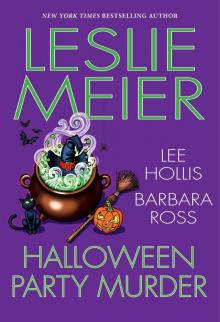 Halloween Party Murder
Halloween Party Murder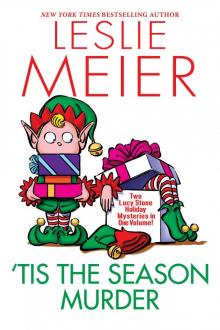 'Tis the Season Murder
'Tis the Season Murder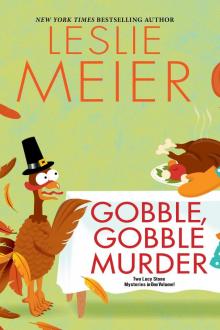 Gobble, Gobble Murder
Gobble, Gobble Murder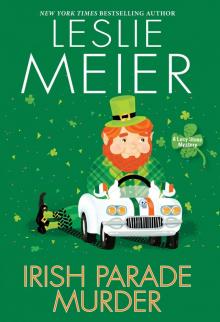 Irish Parade Murder
Irish Parade Murder Bake Sale Murder
Bake Sale Murder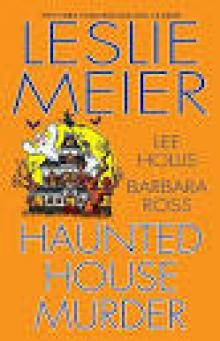 Haunted House Murder
Haunted House Murder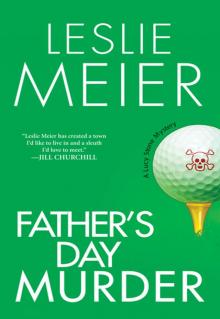 Father’s Day Murder
Father’s Day Murder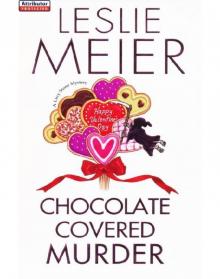 Chocolate Covered Murder
Chocolate Covered Murder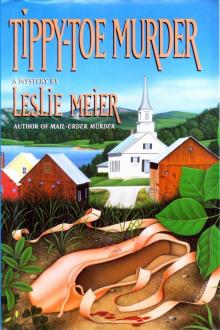 Tippy Toe Murder
Tippy Toe Murder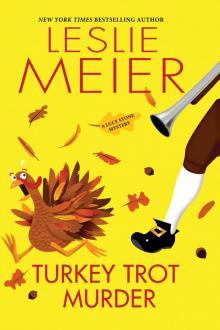 Turkey Trot Murder
Turkey Trot Murder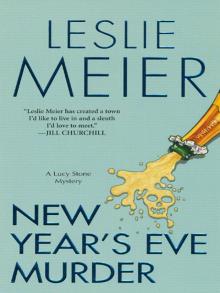 New Year's Eve Murder
New Year's Eve Murder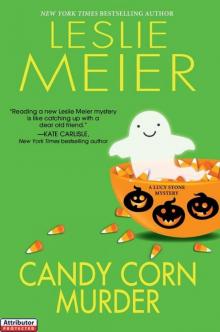 Candy Corn Murder
Candy Corn Murder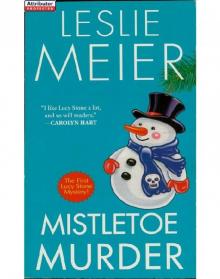 Mistletoe Murder
Mistletoe Murder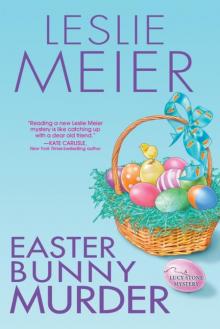 LStone 20 - Easter Bunny Murder
LStone 20 - Easter Bunny Murder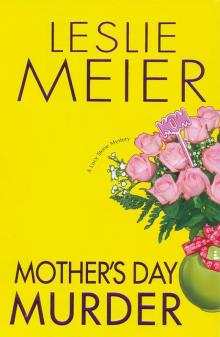 Mother's Day Murder
Mother's Day Murder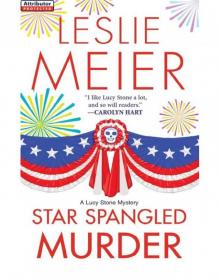 Star Spangled Murder
Star Spangled Murder Silver Anniversary Murder
Silver Anniversary Murder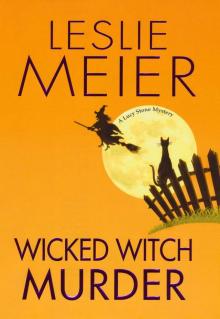 Wicked Witch Murder
Wicked Witch Murder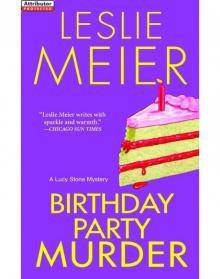 Birthday Party Murder
Birthday Party Murder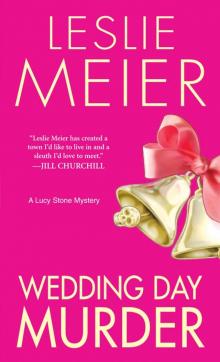 Wedding Day Murder
Wedding Day Murder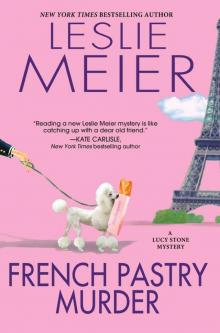 French Pastry Murder
French Pastry Murder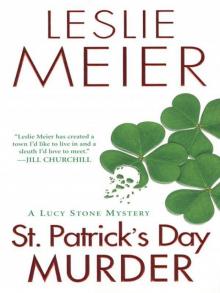 St. Patrick's Day Murder
St. Patrick's Day Murder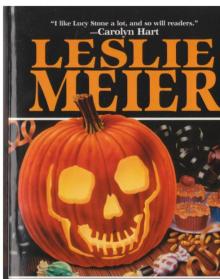 Trick or Treat Murder
Trick or Treat Murder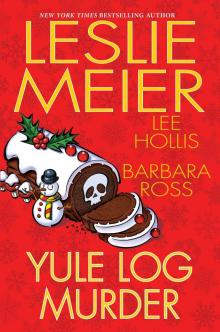 Yule Log Murder
Yule Log Murder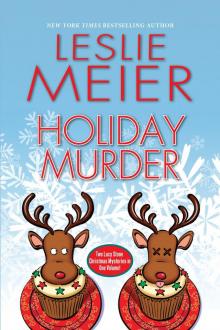 Holiday Murder
Holiday Murder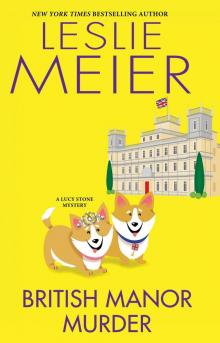 British Manor Murder
British Manor Murder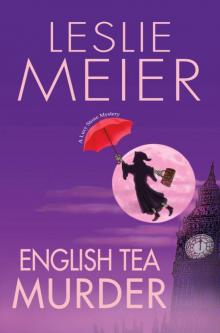 English Tea Murder
English Tea Murder